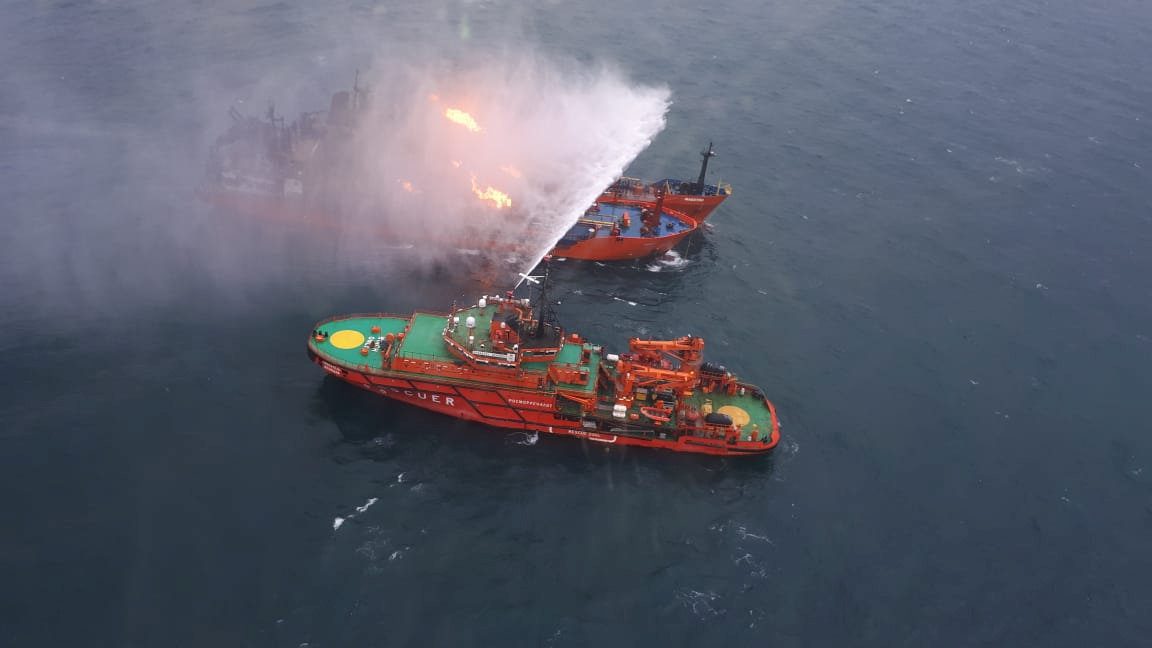An aerial view from a helicopter shows a rescue vessel during a fire-fighting operation following an accident involving two ships, which caught fire in the Kerch Strait, near the coast of Crimea, January 22, 2019. Russian Emergencies Ministry/Handout via REUTERS
By Damir Khalmetov and Alexander Ershov MOSCOW, Jan 22 (Reuters) – Two ships ablaze in the Black Sea region, leaving at least 10 crew dead, caught fire while transferring fuel mid-sea after one vessel was barred from using its usual port in southern Russia due to U.S. sanctions risk, two sources told Reuters.
The vessels, which caught fire on Monday, have the same names as two gas-transporting tankers, the Maestro and Venice, which were included on a U.S. sanctions advisory note last year for delivering fuel to Syria.
The U.S. Treasury note, published in November, advised that any dealings with these or other vessels involved in transporting fuel to Syria could result in sanctions.
The Maestro was subsequently barred from using Temryuk port in southern Russia by the owners of its only gas terminal, Maktren-Nafta, two industry sources said, where it had previously loaded liquefied petroleum gas of Russian and Kazakh origin for export to the Middle East.
The Russian company Maktren-Nafta could not be reached for comment.
Vessels can resort to ship-to-ship transfers of fuel — a risky maneuver especially if they are transferring flammable fuel — if they do not have access to a port for loading.
Temryuk port did not immediately respond to a request for comment. Reuters was unable to reach the owners of the vessels.
Russia’s Transport Ministry said the two ships caught fire on Monday while loading gas ship-to-ship mid-sea, during stormy conditions.
Russia permits loading of gas at just three locations in the region – all on-land ports – a source in the ministry said.
“All ship-to-ship transfers, especially of such dangerous cargo, moreover during stormy weather and in the winter, raises big questions,” the source said.
The ministry source said they did not know whether the tanker had been barred from the port, but added that doing so was within the rights of the owners of the gas loading terminal.
ROUGH SEA
Ten sailors out of a combined crew of 32 were confirmed dead by the ministry’s maritime unit on Tuesday. A further 10 remain missing, presumed dead, while 12 were rescued, it added.
The crew was made up of 16 Turkish citizens and 15 from India, the ministry said.
The ships are still on fire and no attempts are being made to put out the blaze due to rough sea conditions, a ministry spokesman said.
Refinitiv data showed Milano Shipping as the owner of the Venice, and Maestro Shipping of the Maestro. The Venice was recently renamed as the Candy, one industry source said.
But two traders, separate to the industry sources, told Reuters that both vessels were ultimately owned by one Turkish company, Milenyum Denizcilik Gemi.
Milenyum was placed on the U.S. sanctions list in 2015 for arranging the shipment of liquefied petroleum gas and gasoil to Syrian government controlled areas.
Phone numbers for Milenyum and Milano Shipping, listed online, were not answered.
SANCTIONS LIST
On Nov. 20 last year, the U.S. Treasury Department added nine Russian and Iranian individuals and companies on its sanctions list for participating in the shipment of petroleum to Syria.
It also issued an advisory note warning of the potential sanctions risk for any entities involved in such shipments which listed 35 ships, including the Maestro and Venice, as having delivered oil to Syria between 2016 and 2018.
Reuters reported in December that both the Maestro and Venice continued operations after the U.S. announcement, and regularly entered Temryuk port, according to Refinitiv data.
After the Reuters report, the Maestro was barred from using the port’s gas terminal by its owners, and thereby denied access to the port, the two industry sources said.
But the Venice – now known as Candy – continued to dock at Temryuk, Refinitiv data showed.
“There’s every indication that some black scheme was going on,” one of the industry sources said.
“Why else would (the Venice) load up with gas and then immediately transfer it onto another tanker?” the source said, adding that the Venice was likely to have been permitted access to the port as it had changed its name to Candy since the U.S. sanctions note.
Since the U.S. announcement, the Venice/Candy has traveled to near the Lebanese and Syrian coastline on three occasions, Refinitiv data showed on Tuesday, while the Maestro has made the same journey once.
The data does not show at which port the vessels finally docked. They appear to turn around before reaching the coast.
Vessels wishing to conceal their location have been known to switch off their transponders and “go dark.”
Though ships are allowed to switch off their signaling systems in certain circumstances, for example for reasons of security, such instances are relatively limited and rare, Richard Meade, managing editor of Lloyd’s List Intelligence in London said.
“Both vessels weren’t showing up as live… despite being fairly close to land-based receivers,” Meade said. “This certainly would raise red flags in terms of anybody looking at the accident or criminal investigation.”
The Maestro’s signaling system last reported its location on Saturday, when it was located off the coast of Turkey in the Black Sea, according to Refinitiv data.
But on Monday, it was near the Kerch Strait, a body of water between Russian-annexed Crimea and southern Russia, which connects the Azov Sea to the Black Sea.
There, it met the Venice, which had left Temryuk port on Sunday morning with a fresh cargo of liquefied petroleum gas, an industry source said.
After attempting to transfer the highly flammable fuel, both ships were on fire.
(Additional reporting by Gleb Stolyarov, Natalia Chumakova and Tom Balmforth; writing by Polina Ivanova; Editing by Christian Lowe and Alison Williams)
(c) Copyright Thomson Reuters 2019.

 Join The Club
Join The Club











